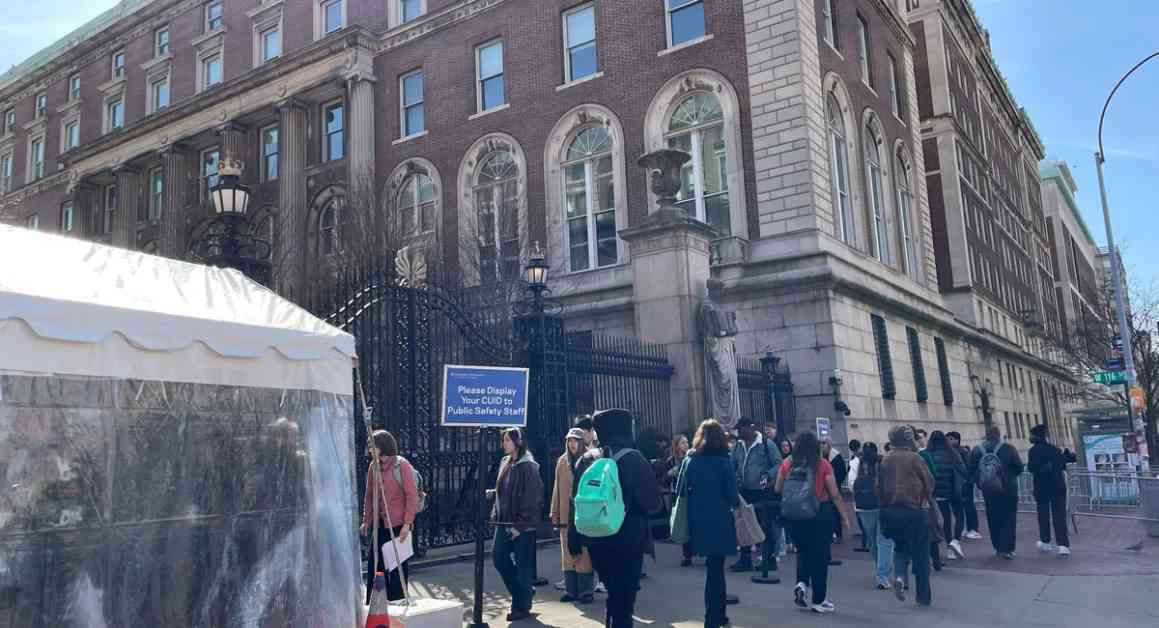Columbia University under Fire Amidst Government Scrutiny
Last year, Columbia University made headlines for its passionate campus demonstrations against the war in Gaza. Now, the prestigious institution finds itself in the crosshairs of the Trump administration, facing allegations of antisemitism, colluding with terrorist groups, and financial penalties. The federal authorities have created a cloud of uncertainty surrounding the accusations against students, leading to a stifling environment that hampers free expression and academic pursuits on campus.
Tensions escalated last week as the Trump administration announced a freeze of $400 million in federal grants for Columbia University, citing concerns over violence, intimidation, and antisemitic harassment within the campus. The university soon became the focal point of government scrutiny, causing a ripple effect of arrests, deportations, and expulsions among students and activists.
ICE agents detained former graduate student Mahmoud Khalil, a pro-Palestinian activist, accusing him of supporting Hamas. Khalil vehemently denied the allegations, emphasizing his innocence and lack of connection to the terrorist organization. Despite the absence of criminal charges, he was apprehended without due process, sparking outrage within the university community and beyond.
The university administration announced the expulsion and suspension of several students who participated in the occupation of Hamilton Hall during protests against the Gaza conflict. These disciplinary actions, following a series of hearings by the University Judicial Board, further fueled discontent among students and faculty members.
In a disturbing turn of events, federal immigration agents conducted searches at two student residences on campus, although no individuals were detained. Interim President Katrina Armstrong expressed her dismay over the searches, highlighting the university’s obligation to comply with federal warrants while maintaining a commitment to student welfare and safety.
Homeland Security Secretary Kristi Noem revoked the visa of an urban planning doctoral student from India, Ranjani Srinivasan, on allegations of supporting Hamas activities. Additionally, a Palestinian student, Leqaa Kordia, was arrested for overstaying a student visa and participating in pro-Hamas protests. However, university officials disputed Kordia’s enrollment status, raising questions about the accuracy of the government’s claims.
Amidst the escalating tensions, students and staff encountered heightened security measures, with protests outside campus and police presence intensifying. The atmosphere of fear and surveillance impeded the spirit of free speech and academic freedom, prompting concerns about the impact on educational integrity and student well-being.
Johanna Sommer, a student at the Graduate School of Journalism, lamented the erosion of students’ rights to organize and protest freely, emphasizing the importance of defending constitutional principles in times of adversity. Despite the challenges, she asserted her commitment to upholding democratic values and advocating for justice within the university community.
As the situation unfolded, diverse perspectives emerged among students, parents, and faculty members regarding the government’s actions and the university’s response. While some expressed apprehension over security threats and endorsed stringent measures, others criticized the excessive surveillance and restrictions on campus life, calling for a balanced approach to safeguarding academic freedoms and civil liberties.
Amidst the turmoil, Interim President Katrina Armstrong reassured the university community of Columbia’s enduring commitment to knowledge, justice, and inclusivity. In a late-night email, she underscored the university’s resilience in the face of adversity, reaffirming its dedication to fostering a safe, supportive environment for all members of the community.
Armstrong’s message resonated with students, faculty, and parents alike, highlighting the importance of mental health resources, religious support services, and community resilience during challenging times. As Columbia University navigates the storm of government scrutiny and internal discord, the spirit of unity, learning, and advocacy remains steadfast, guiding the institution through turbulent waters towards a brighter future.












